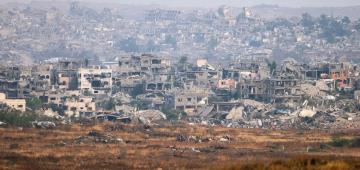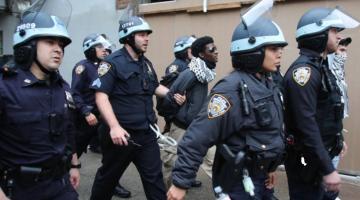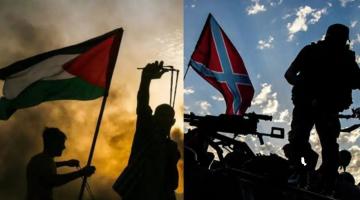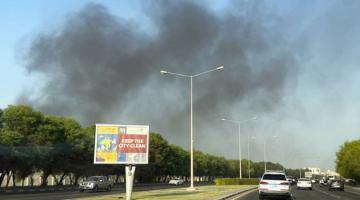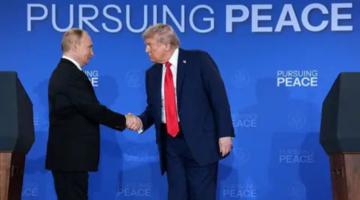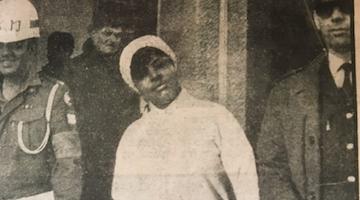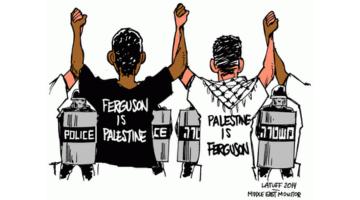Shirley Graham Du Bois on the liberation of Palestine.
Soon after Shirley Graham Du Bois’ passing in Beijing, China, on 27 March 1977, a short notice of her death appeared in Free Palestine, the Washington D.C. monthly of the organization Friends of Free Palestine. The notice in Free Palestine praised Du Bois as “a dedicated and humane friend of the Palestinian and Arab people” who was among the more prominent African-American figures calling on Black folk to support the Palestinian revolutionary struggle. Free Palestine recounted that DuBois worked closely with Palestinian activists during her year in Cairo, and noted a 1974 speech that Du Bois gave at Howard University where she compared the racist regimes of “Israel” and South Africa, urging Black Americans to fight against both. “The Palestinian people have lost a comrade and friend,” Free Palestine concluded. “Shirley Graham, however, lives in the minds and hearts of the Palestinian people.”
A 1970 essay by Du Bois in Free Palestine nearly a decade before her passing provides a powerful demonstration of her commitment to the Palestinian cause, and to anti-imperialist struggles more broadly. Titled “Toward Lasting Peace,” the essay places the Palestinian struggle in the broader contexts of imperialist offensives in Africa and Asia. DuBois traces the long history of zionist planning and propaganda in the region, including the attempt to seduce emerging African nations through economic and military support.
“Towards a Lasting Peace” is a smart, strikingly militant essay – from its opening salvo that there will be no lasting peace in the region until Palestine is free to its celebration of the “mighty tramping of the Palestine commandos.” The essay is also, to use DuBois’s own word, optimistic, for it is buoyed by the certainty that the revolutionary forces will be victorious. While that victory did not come in Du Bois’ lifetime, it may still come in ours. Amidst the endless despair brought on by the continuing zionist genocide against the people of Palestine, we should not lose Du Bois’ radical optimism.
We reprint Shirley Graham Du Bois’s “Toward Lasting Peace” below.
Towards Lasting Peace
Shirley Graham DuBois
There will be no lasting peace in the Middle East until the just claims of the Palestinians are met. Everybody out here knows this and it's time the peoples of the world should be told the Truth. No Arab country can make “peace” with Zionist Israel!
Had Israel accepted the Security Council Resolution of November, 1967, had she then withdrawn from the territories she had overrun in her blitzkrieg, she might have been able to live calmly for several years to come. And it is possible that in the course of those years, some basic agreement for peace might have been achieved. There is precedent for such action. In the autumn of 1962 the Chinese army beat the Indian army as quickly and as decisively as the Israelis executed their strike into Sinai and Jordan. Immediately afterwards, the Chinese voluntarily withdrew to their positions, despite the fact that the Assam region lay open to them with no defense whatsoever. By so doing, China did far better than Israel with her policy of holding everything in her fist to impose pressure on the Arabs. The winning card has exploded in her hand! and now there can be no “agreement.” Too much blood has been spilt; too many more refugees have been made; too many houses have been blown up and too many young Palestinian patriots have been tortured.
“Stop fighting and start talking!” About what? About Egypt withdrawing from her Canal and turning more of her land over to aggressors? About “secure borders for Israel’’ while the Palestinians are still homeless and Israel keeps tight hold on Jerusalem and the Golan Heights? Does somebody think the Arabs are out of their minds?
“Under flaming, fiery skies, through seas of crimson blood — to Peace.” This is the way designated months ago by Gamal Abdul Nasser. And the people of Egypt responded, ‘“‘We will go!”
This “way” has already been opened up and followed by the new force which has risen so dramatically in this part of the world — a popular, peoples army — which transcends national boundaries, maintains recruiting stations throughout the Islamic world, is financially supported by all the oil-rich countries, has its own Military Command and has as its goal the wrestling of Palestine from the grip of the Zionists and returning it to Palestinians.
The Palestinian Commandos were not created by national decree or constitutional amendment. They came into being out of necessity.
The core, of course, dates back to the beginning of Palestinian resistance to the take-over of their country. We shall not here review the bloodshed and pillage through which the Palestinian people not only lost political control of their country, but also lost the right to live in their homeland. A conscious-stricken world, shamed and sickened by the fate of Jews under Hitler, paid little attention to what was happening in the Middle East. The West was intent on washing its own hands of guilt. It ignored the fact that by the time the “State of Israel” was recognized, Palestinians still alive had been stripped of everything, were refugees in desert camps, or were scattered to the four winds.
With each passing year, the Israelis made further encroachments on Arab lands. Neither Jews, who originally lived in Palestine, nor Jews who had suffered under Hitler had a voice in the developing policies of the new state. Its policy makers and rulers came from the United States of America and from South Africa. And they brought with them not only all the imperialist designs of the first, but also the hideous apartheid thinking of the latter.
They are the top, superior people — all others (Jews from surrounding countries, Asia, etc.) are inferior and Africans or peoples of African descent are designated as kushites, traditional “‘hewers of wood and drawers of water.”
This policy was carefully camouflaged at first when Israel was struggling to establish herself firmly in the region. Instead, an exaggerated interest and concern was shown towards the emerging states of Africa. Israel was among the first to acknowledge their independence and to negotiate for diplomatic relations. Aid was offered and accepted by the anxious, ambitious underdeveloped countries. The projects undertaken and technical assistance sent to African countries from Israel would be incredible if one does not realize that behind this “generous little state” are the vast resources of the United States — in large part extracted from Africa and the Middle East.
On their side, Africans, who had suffered so much, had instantly responded to the needs of suffering Jews. Offers had earlier been made by Africans to accept Jewish refugees. Plans went forward for settlement of the victims of Hitler in Guinea, while it was still part of the French community. Of course, these plans were not accepted.
Gradually, however, time has torn off the mask! Africans are beginning to recognize Israel for what it is. In June, the West African State of Gabon broke off diplomatic relations with Israel because of insulting treatment towards the wife of Gabon’s President during her visit there. As one black man from the States described it to me:
“Israel is Whitey’s most arrogant front, bent on holding a strategic base at the important center of the crossroads between Africa and Asia!”
Throughout all the years of occupation secret guerrilla bands of Palestinians have done what they could to inflict damage wherever they could. Following the 1967 war, the guerrilla movements stepped up their activities, the refugee camps came alive with purpose and determination. Al Fatah, under Yasser Arafat, emerged as a large armed military unit and proved itself capable of engaging the Israelis in open warfare. The Popular Front for the Liberation of Palestine, under George Habash, captured headlines with its attacks on Israeli planes and the announcement that it intended to strike at Israeli interests ‘‘anywhere in the world.” The idea of the commandos caught on — their ranks swelled — not only by additions of young Arabs, men and girls, from near and far, but from France, Italy, Sweden, Denmark and (believe it or not) from the United States, came young Blacks, asking to be allowed to “join up!”
Thus, the Palestinian resistance movement has assumed proportions which has been recognized by friends and by enemies. The goal of all the commandos is identical: the return to Palestine. But different groups have used different tactics and strategy. This sometimes gave rise to disputes and waste of effort. Good sense has prevailed and now all groups have come together to form the Palestine Liberation Organization operating under a strong Central Executive Committee. Liberation of Palestine comes first, followed by the setting up of “a progressive, non-sectarian, democratic State in which Jew, Christian and Moslem may live in Peace with equality for all and discrimination towards none.”
Neither the Palestinians, nor the surrounding Arab countries have yet reached their peak of effort. So far, the UAR, Jordan, Syria and Lebanon have only defended themselves. They have not attacked Israel — their raids have been into their own lands, occupied since 1967. When one reads, therefore, of a settlement or village being shelled, remember that it is a settlement which the Israelis have set up in occupied territory.
Time is on the side of the Arabs. Last September, I wrote, “The Libyan Revolution has changed the balance of power in the Middle East.” I was criticized for my “optimism.” “Those young men,” said my critic, “have seized power by a daring strike; they may be sincere, and mean well, but they have no experience. How can they hold out against the cunning, skill, maneuvers and sheer weight of western imperialism? If you think the United States and Great Britain are going to let Libya slip out of their hands – you’re crazy!”
So — nearly a year has passed — and I’m still crazy. If “those young men” had accomplished nothing else but the ridding of North Africa of British and American military bases, they would have made an historic contribution to the liberation of this continent. But much more has been accomplished by the new Libyan Government. For one thing: Palestinian Commandos are now being trained on Libyan soil which was formerly used as a training ground for American pilots!
Libya is a very rich country. And when the new government demanded a larger share in the profits of their oil, the American-owned Esso Oil was the first of the twenty-one foreign oil companies operating in Libya to agree. A cut-off in the flow of petroleum from Libya would affect the United States not only in the loss of profits, but also in the subsequent weakening of the economic and defense systems of United States allies.
So, 28-year-old Col. Moamer El Qaddafy, Chairman of the Libyan Revolution Command Council and Prime Minister, demonstrated strength when, this June, he traveled from one country after another in the Middle East urging Heads of States and people to pool all their resources for the struggle. In Cairo, he told the National Assembly:
“We are facing great world powers, which stand frankly and directly with Israel against the Arabs. This means that the sons of the Arab nation must rise above all challenges, it calls for the overall mobilization of the Arab nation from its ocean to the Gulf in preparedness to fight the people’s war in the necessary battle of resistance...”
The fiery, young revolutionist urged definite plans of unified action everywhere he went – together with unified economic pressures. The very same day that he told welcoming crowds in the southern Iraqi city of Basra:
“The Arab masses have now broken all shackles and gained the freedom of expression to demand unity and freedom” —
That day the Libyan Revolution Command Council in Tripoli nationalized all Barcley’s Banks in the country.
In February of this year, Mohamed Hassanein Heikal, UAR Minister of National Guidance and Egypt's most astute military analyst, discussed in the Cairo daily, Al Ahram “The Next 100 Days of War.” I should like to set out some of the points he made:
1. “In the coming 100 days, pressure on you will reach its extreme. They (Israelis) are carrying out a policy upon which they have agreed with the United States... because that is the time that remains for the evacuation of the American base at Wheelus, near Tripoli.
“The Libyan revolution came as a great surprise for Washington. This was a shock to Washington which made it hard to assess the loss caused by Libya's exit from the framework of imperialist domination... Three events followed which irked the United States more than anything else in the Arab world. These were: Gamal Abdul Nasser’s reception in Tripoli and Benghazi, the special rapprochement between Egypt, Libya and the Sudan, and the French-Libyan arms deal involving one hundred Mirage aircraft...
“The considerations wound up in full agreement on the need to escalate action against Egypt by all means and to intensify that escalation in a way that would achieve certain results before time for the evacuation of the Wheelus base. They want destruction of the set-up in Egypt while they are still in Wheelus and have not completely left it, on the assumption that they will be able to arrange things for themselves there.
2. “The United States has authorized Israel to use Phantom aircraft in raids in depth over Egyptian territory...it has exerted pressure on the United Nations to prevent the recording of the types of aircraft which violate the cease-fire line…
3. “After that is to come intensive concentration on Gamal Abdul Nasser... Everybody in Israel from Golda Meir to David Ben Gurion, repeats the slogan that Gamal Abdul Nasser should go and go quickly. His departure would be the first step towards the solution which would satisfy Israel... The military establishment in Israel believes it can, by intensifying the pressure on Egypt through air raids, obtain results in a matter of six weeks. They imagine that in six weeks they can rid themselves of the entire regime in Egypt...
Well, the “‘raids in depth” certainly took place! Towards the end of March, UAR military intelligence picked up the warning that the Israelis were planning a concentrated attack on President Nasser’s home in the suburbs of Cairo. With no sign yet that he was “toppling” it was reported they were going to try to kill him. I had personal knowledge that Israeli planes could fly over Cairo — having been almost tossed out of bed at dawn one morning by what seemed like the crashing of a bomb — very close. It turned out that this was not a bomb, but the breaking of the sound barrier by an Israeli plane right over my head! In spite of rapid firing of anti-aircraft guns, the plane got away. It was flying so low that our guns could not get it in sight.
Nobody dared suggest that President Nasser leave Cairo. I had seen him a few days before, walking slowly through the streets with other mourners in the funeral procession of a slain officer — and everybody knew that he turned up at any hour of the day or night on the Canal front. Egyptian planes clashed with the Israelis — Egyptian soldiers crossed the Canal and destroyed Israeli installations on the occupied bank. But still the faster, more powerful Israeli planes were getting through.
All the world knows now what happened: The Russians came with their latest defense equipment.
The Israelis give out exact figures on how many Russians, tanks, planes and flyers are here. I have no such information. I have yet to see a Russian soldier in Cairo — but we all know that the precise SAM 3’s are around. And we know that Russian warships and plane carriers are close by in the Mediterranean and in the Red Sea.
As of this date, bombing “in depth” has ceased —the Libyan flag flies over Wheelus Base — and Gamal Abdul Nasser is still around!
Speaking June 25th, at Benghazi, on the occasion of celebrations marking the withdrawal of all foreign bases from Libyan soil, President Nasser said:
“Brothers, heroic people, revolutionaries and free men, we are preparing for a major battle against Israel which is supported by the imperialist forces of the United States. We will soon be able to catch up with Israel air superiority and to attain air equality because we are training hundreds of pilots and we are receiving hundreds of aircraft.
“They (Israelis) confine their raids to the Suez Canal area because they know that the Egyptian army has completed its training for crossing, and that if the Egyptian army has the chance to achieve air equality, no power in the world will stop it from crossing, even if America, American press and American leaders call for preservation of Israeli superiority.
“We say here that whether the question is to be dealt with politically or militarily, we will not accept anything, less than withdrawal from all usurped Arab territories. We will not under any circumstances forego the rights of the Palestine people to their land and their country.”
These are not idle words. Gamal Abdul Nasser is the Elder Statesman who has stood firm through the storms of many years; as a soldier he crawled away from a battlefield strewn with his dead comrades; he was the leader whose followers faltered and drained away behind him; he is the Man who would not give up in the face of defeat. Now, as President Nasser looks out from the place where he stands, he sees the vast Arab Nation uniting as never before in its history, he sees the emergence of valiant, young leaders, confident and sure of themselves and their peoples, he sees the masses alert to their capacities, willing to sacrifice and unafraid.
And up ahead — he hears the mighty tramping of the Palestine commandos-— their eyes and hearts lifted — their voices raised in salute to Free Palestine.
July 1, 1970, Cairo
Shirley Graham Du Bois, “Towards Lasting Peace,” Free Palestine, 2 no. 4 (August, 1970)

